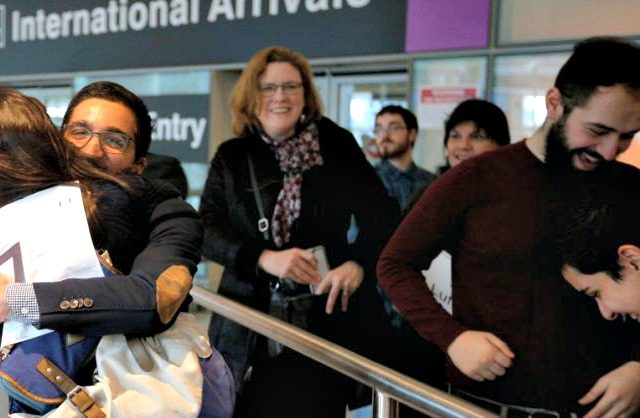The number of refugees who arrived in the United States in the first full week after the Supreme Court’s decision on June 26 on President Trump’s Executive Order 13780 declined to about half of the most recent weekly arrivals.
In the seven days between June 27 and July 3, only 399 refugees were resettled in the United States as part of the federal refugee resettlement program, according to the Department of State interactive website. During the eight most recent previous weeks, from May 2 to June 26, a total of 6,442 refugees were resettled, or an average of 805 per week.
The new arrivals brought the total number of refugees resettled in the United States in FY 2017 to 49,225, which is just 775 below the 50,000 limit set for the fiscal year by President Trump in Executive Order 13780.
The total number of refugees resettled in the United States during the first nine months and three days of FY 2017 is slightly less than the 49,801 who were resettled during the first nine months and three days of FY 2016.
The final numbers for FY 2017, are likely to be significantly less than the 84,995 resettled in FY 2016.
If the most recent week is any indication, the Trump administration may decrease the rate of new refugee arrivals. At this time in FY 2016, in contrast, the Obama administration accelerated the rate of new arrivals.
As a point of comparison, a total of 1,732 refugees were resettled in the United States during the same seven day period—June 27 to July 3—in FY 2016.
Over the last 13 weeks of FY 2016, the Obama administration resettled a total of 35,194 refugees in the United States, more than 2,500 each week.
How the last 13 weeks of FY 2017 will play out under the Trump administration remains uncertain.
The Supreme Court’s per curiam decision largely upheld Executive Order 13780’s 120 day temporary ban on refugee arrivals as well as its 50,000 ceiling on refugees in FY 2017, but it allowed an exception for those refugee applicants with a “bona fide relationship” to a person in the United States.
Justice Thomas wrote a separate opinion concurring in part and dissenting in part, in which he expressed, “I fear that the Court’s remedy will prove unworkable.”
Today’s compromise will burden executive officials with the task of deciding—on peril of contempt— whether individuals from the six affected nations who wish to enter the United States have a sufficient connection to a person or entity in this country.
The compromise also will invite a flood of litigation until this case is finally resolved on the merits, as parties and courts struggle to determine what exactly constitutes a “bona fide relationship,” who precisely has a “credible claim” to that relationship, and whether the claimed relationship was formed “simply to avoid §2(c)” of Executive
Order No. 13780.And litigation of the factual and legal issues that are likely to arise will presumably be directed to the two District Courts whose initial orders in these cases this Court has now—unanimously—found sufficiently questionable to be stayed as to the vast majority of the people potentially affected.
The Trump administration moved quickly after the Supreme Court’s decision to define “bona fide relationship” as a parent, child, sibling, spouse, or fiancé. It excluded grandparents and other more distant relatives from that definition.
As Justice Thomas predicted, litigation quickly followed.
“The state of Hawaii asked a federal judge in Honolulu on Thursday to clarify a US Supreme Court ruling that reinstated parts of President Donald Trump’s revised travel ban, arguing that the Trump administration had interpreted the court’s decision too narrowly,” Reuters reported three days after the June 26 Supreme Court decision:
In a court filing, Hawaii said the US government intended to violate the Supreme Court’s instructions by improperly excluding from the United States people who actually have a close family relationship to US persons. . .
Hawaii called the refusal to recognize grandparents, fiancés, and other relatives as an acceptable family relationship “a plain violation of the Supreme Court’s command.”
Hawaii’s Attorney General Doug Chin asked US District Judge Derrick Watson in Honolulu, who blocked Trump’s travel ban in March, to issue an order “as soon as possible” clarifying how the Supreme Court’s ruling should be interpreted.
The outcome of that challenge has not yet been determined.

COMMENTS
Please let us know if you're having issues with commenting.